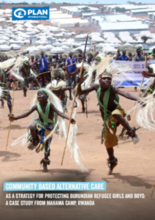This case study describes the community-based alternative care system developed to address the child protection concerns of unaccompanied and separated Burundian girls and boys in Mahama refugee camp in Rwanda between 2015 and 2016.
In April 2015, Burundian president Nkurunziza announced his run for a third presidential term, sparking nationwide protests followed by months of violence and political instability. Within three months of the announcement, over 150,000 people fled Burundi. While families sent their children to seek refuge in neighboring countries, many parents stayed behind to guard their houses and belongings. As a result, over 2,000 unaccompanied and separated children arrived at Mahama Refugee Camp in neighboring Rwanda by the end of 2016.
With a sudden influx of vulnerable children without parental care in Mahama camp, Plan International and partners developed and implemented a community-based child protection program to address the quickly changing needs of the community within Mahama camp. Following the assessment of national alternative care models in both Burundi and Rwanda, a camp-based system for separated and unaccompanied children was designed and a local refugee workforce established and trained to respond to the needs of vulnerable children within their community. While prioritizing kinship care, the camp-based model used foster care and independent living as alternative care options. Findings from the case study suggest that using a community-based model of care dramatically increased the child protection concerns reported by community members, contributed to an improved protective environment by changing community perceptions about unaccompanied children, and effectively alleviated some of the strain within the Child Protection Case Management system.

